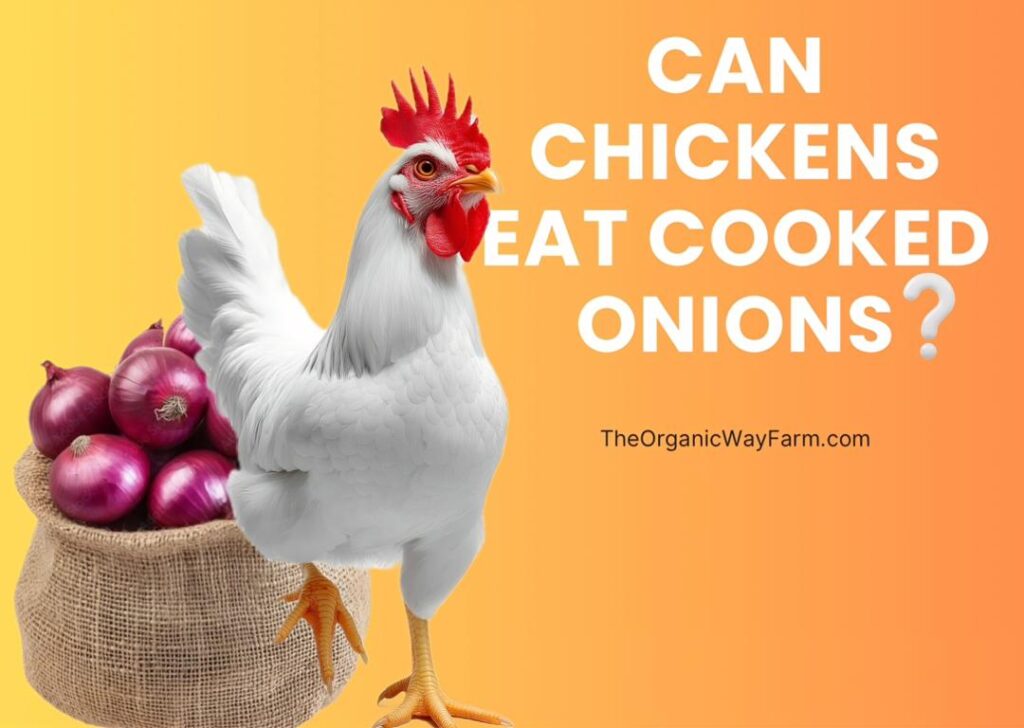If you have chickens and want to treat them to something special, you might be curious about a common kitchen staple: onions. This leads us to the question, “Can chickens eat cooked onions?” You’re not alone in asking this! So many people wonder about the safety and health aspects of feeding their chickens various foods.
The answer to whether chickens can eat cooked onions is a bit complex. In general, onions are not recommended for chickens in any form, cooked or raw. This is because onions contain substances that can be harmful to them. Although chicken’s diets should include a variety of foods, it’s important to select safe and healthy options for them.
We encourage you to continue reading as we explore this topic in more detail. We’ll discuss how much cooked onions are safe, the best ways to feed different foods to chickens, the benefits and risks associated with feeding them certain foods, and suitable substitutes for onions. Join us on this insightful journey, and let’s learn how to provide the best care for our feathered friends! Below is what we will look at:
- Can Chickens Eat Cooked Onions?
- How Much Cooked Onions Can Chickens Eat?
- Best Way to Feed Cooked Onions to Chickens
- Benefits of Feeding Cooked Onions to Chickens
- Risks and Dangers of Feeding Cooked Onions to Chickens
- Substitutes for Cooked Onions for Chickens
- Frequently Asked Questions about Feeding Cooked Onions to Chickens
- Final Thoughts on Feeding Cooked Onions to Chickens
Lets Begin!
Can Chickens Eat Cooked Onions?

Chickens, like us, have specific dietary needs, and certain foods can be harmful to them. When it comes to onions, it is essential to understand that they are not suitable for our feathered friends. This is because onions, whether cooked, raw, or dehydrated, contain compounds called thiosulfates. These compounds can lead to a serious condition in chickens known as hemolytic anemia. This condition happens when the red blood cells in chickens get damaged, making it challenging for them to carry oxygen throughout their bodies.
Some may wonder why cooking onions might make them safer. While cooking may reduce some harmful substances in certain foods, it does not remove thiosulfates from onions. Therefore, regardless of whether onions are cooked, they can still pose a threat to chickens’ health. If we care for our chickens, we need to make informed choices about what we feed them.
Interestingly, chickens are known to be quite picky about what they eat. While some might nibble on cooked onions if they find them in the yard or coop, it is crucial to avoid intentionally feeding them this food. Instead, we should focus on providing a balanced diet that meets their nutritional needs and keeps them healthy.
How Much Cooked Onion Can Chickens Eat?
Since we’ve established that chickens should avoid onions altogether, it’s important to highlight that there should be no amount of cooked onions fed to them. To ensure their health, we should refrain from even small quantities of this food. If a chicken accidentally consumes a small piece of cooked onion, it may not always result in immediate harm. However, over time, regular exposure to onions may lead to serious health issues.
Instead, we can explore healthier options for our chickens. Providing a wide range of grains, seeds, vegetables, and fruits can help create a nutritious diet and keep them happy. It is always better to err on the side of caution when it comes to feeding chickens.
If we notice that our chickens display any unusual behavior after consuming something they shouldn’t, it’s essential to consult a veterinarian promptly. Their health is our responsibility, and as caregivers, we should prioritize their well-being by ensuring they eat safe and beneficial food.
Next, let us look at the best ways to feed chickens their food to ensure they get the most nutrition and maintain their enjoyment of meal times. We’ll also cover some delicious alternatives that are safe for chickens.
Best Way to Feed Cooked Onions to Chickens
While it might be tempting to share our delicious meals with our chickens, feeding them cooked onions is not a great idea. Instead, let us explore how we can deliver safe and healthy food options to them. When feeding chickens, how we present their food makes a difference in their mealtime enjoyment.
Chickens love variety and appreciate a colorful plate! We can mix their feed with chopped vegetables, fruits, or grains to make it more appealing. Consider offering them chopped carrots, leafy greens, berries, or even small bits of apple.
When preparing feeding times, ensure the food is fresh and clean. Provide ample water at all times, as hydration is just as important as nutrition. Keep an eye on the food to prevent spoiling, as chickens can be sensitive to mold and bacteria.
In particular, when offering vegetables like carrots or leafy greens, cut them into smaller pieces. This approach helps prevent choking and makes it easier for chickens to enjoy their meals. Chickens are natural foragers, and they love to scratch around. So scattering their food around their coop or run can make mealtime more engaging.
Instead of attempting to feed cooked onions, we can find safe snacks that fulfill our chickens’ cravings for something new and different. They can also enjoy the nutritional benefits these healthier options provide.
Benefits of Feeding Cooked Onions to Chickens
Hydration
Even though we advise against feeding cooked onions to chickens, we can guarantee that the right foods can contribute positively to their hydration. Foods like cucumbers, berries, and melons are fantastic options for keeping chickens hydrated. Proper hydration is essential for chickens, especially in hotter weather. Keeping their water supply filled with fresh water also helps them maintain their health.
Fiber
Chickens require fiber in their diet for good digestion. Feeding them fruits and vegetables provides ample fiber to help prevent digestive problems. For instance, leafy greens and certain fruits act as vital sources of fiber that we can incorporate into our chickens’ diets. Fiber-rich foods help keep their digestive systems functioning correctly, allowing chickens to absorb nutrients effectively.
Vitamins and Minerals
Chickens need vitamins and minerals to remain healthy. Instead of cooked onions, consider offering vitamin-rich options such as carrots, squash, dark leafy greens, and melon. These foods ensure the chickens receive essential nutrients, contributing to overall health and well-being.
Mental Stimulation
Feeding our chickens varied foods also extends to providing them with mental stimulation. Chickens are intelligent animals and thrive when they can scratch around, peck at different foods, and explore new options. Presenting meals in interactive ways, like scatter feeding or mixing various food items, will keep their minds sharp.
Nutritional Breakdown of Grapes
Grapes are a fantastic treat for chickens! They are hydrating and full of vitamins, which can support healthy growth and egg production. However, moderation is key, as grapes can be sugary. Offering grapes alongside other vegetables and grains helps balance their diet and provides a treat without compromising nutrition.
Risks and Dangers of Feeding Cooked Onions to Chickens
As we mentioned previously, the risk associated with feeding cooked onions greatly outweighs any potential benefits. Even small amounts of onions can lead to health issues in chickens. Hemolytic anemia, resulting from consistent onion consumption, can severely impact their quality of life.
Chickens are unable to effectively eliminate thiosulfates from their systems, leading to the accumulation of these harmful substances, resulting in damage to their red blood cells. Symptoms that may arise include weakness, lethargy, and pale combs and wattles. Affected chickens may also have difficulty breathing and may exhibit unusual behavior.
If we recognize these symptoms in our flock, it is vital to seek veterinary assistance immediately. Early diagnosis and treatment are crucial in mitigating the impacts of this condition. It’s our duty as caregivers to maintain awareness of the foods we offer and prioritize their safety.
Substitutes for Cooked Onions for Chickens
Finding suitable substitutes for cooked onions is important in incorporating safe and healthy foods into our chickens’ diets. Instead of onions, let’s consider options like fruits and vegetables.
Vegetables such as carrots, zucchini, or even sweet potatoes can serve as excellent alternatives. You can steam, roast, or serve them fresh. Fruits like berries, apples, and watermelon provide hydration while being tasty treats.
Offering whole grains is another great substitute to consider. Whole grains provide energy and act as rewards for chickens to forage for. Feed them grains like oats, barley, or commercial chicken feed that includes a mix of wholesome ingredients to ensure a balanced diet.
These alternatives not only promote health but also let our chickens indulge in a variety of flavors, making their meals more enjoyable!
Frequently Asked Questions about Feeding Cooked Onions to Chickens
Can Chickens Eat Other Types of Onions?
All types of onions, including red, yellow, and green onions, are harmful to chickens. None of these should be included in their diet.
What Should I Do If My Chicken Eats Onions?
If a chicken consumes a small piece of onion, closely monitor them for any distress. If any unusual symptoms appear, consult a veterinarian to check for any health risks.
Are There Any Safe Vegetables for Chickens?
Yes! Safe vegetables include carrots, broccoli, spinach, and squash. Always introduce new foods gradually and in moderation.
How Do I Know What Foods Are Safe for Chickens?
Research and understanding are key. Focus on feeding them grains, seeds, fruits, and vegetables. Consult resources or experts on optimal chicken nutrition.
Can Chickens Eat Cooked Foods?
Chickens can enjoy some cooked foods, but it’s crucial to avoid those that are harmful, like onions. Always practice caution with spices, oils, and other additives.
Final Thoughts
Feeding our chickens requires thoughtful consideration. While cooked onions may seem harmless in our kitchens, they pose significant risks to our feathered friends. By acknowledging these dangers and opting for safer alternatives, we can ensure that our chickens live healthy and happy lives. Let’s continue to explore safe and nutritious options while giving our chickens the best care possible. Remember that our goal is to provide them with a balanced diet filled with safe foods that promote their well-being.
If you’re interested in more topics about chicken care, don’t hesitate to explore other articles on feeding different foods like grapes to our beloved birds. Together, we can create the happiest and healthiest environment for our chickens!






